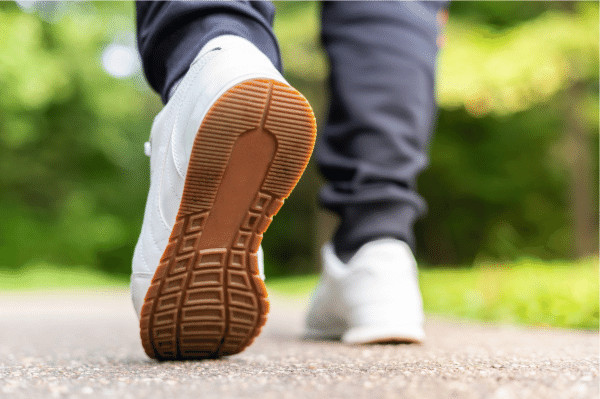There are more than 5 benefits of walking daily! Walking is a stellar form of exercise. Most likely, you do it every day. It is a much-overlooked form of exercise because it seems too simple. The truth is that walking may be the best form of exercise, because is achievable by almost everyone. Some people get pedometers or fitness trackers to see how far they walk each day.
This post contains affiliate links. If you click on and purchase through one of those links, you won’t pay a penny more, but we’ll get a small commission, which helps keep our website operating. Thanks! As an Amazon Associate, I earn from qualifying purchases.
5 Benefits of Walking Daily
Here are some benefits you may get by walking 20 minutes or more each day.
1-Promotes Weight Loss
One advantage that we all think of is losing belly fat. Burning a few extra calories each day is a good way to get and stay healthy. Visceral fat, that collects around the organs in your “belly” area is one of the most dangerous types of fat to have, and it is one of the easiest types to lose! Brisk walking is a fantastic way to lose visceral fat.
The calories you burn, will be determined in a large part by the speed you walk, the terrain you walk on (uphill or down), and the distance you go. Walking is a good way to reduce calories and tame your sweet tooth, as well!
2-Eases Joint Pain
According to the Harvard Medical School, several studies have shown that walking lubricates the joints, especially the joints of the hips and knees. Not only does walking reduce arthritis-related pain but walking five to six miles each week can even prevent arthritis from forming in the first place!
Walking is a low-impact exercise that can reduce your pain level. It is an excellent way to keep your joints from becoming stiff and keeps your muscles flexible. It strengthens the muscles around your joints and keeps your joints moving smoothly.
When compared to many other types of activities, walking is kind to your body.

3-Reduces the Risk of Some Common Diseases
a.Type 2 Diabetes
Walking helps you manage your blood sugar levels. Research published in the Journals of Gerontology indicates that short walks after prolonged sitting can have a positive effect on insulin levels. (Dr. Jampolis recommends walking after meals, especially after dinner, to aid in blood-sugar control.)
One large study of 197,825 non-diabetic adults found that fast-walking was associated with a lower rate of type 2 diabetes.
b.High Blood Pressure
“In general, the number one cause of high blood pressure in the United States and Western countries is a poor-quality lifestyle,” says Dr. Neerav Sheth, a cardiologist with Cardiology Consultants of Philadelphia. “That includes not exercising, being overweight, having excess salt and alcohol intake, poor quality sleep, and a high stress level.”
Benefits of walking would be:
- Better sleep
- More exercise
- Reduced stress levels
- Weight management
c.Improves Cardiovascular Health
The cardiovascular system includes the heart, the blood vessels, and the lymphatic vessels.
Regular walks can help prevent or manage heart disease, stroke, and high blood pressure, says Dr. Melina B. Jampolis, MD, physician nutrition specialist and host of the “Practically Healthy” by Dr. Melina podcast.
The Journal of Sport Health and Science found “significant associations” between step count and risk of all-cause mortality, as well as cardiac events. Those who walked an average of 9,500 steps daily showed a decreased risk of all-cause mortality of nearly 35 percent and a lower risk of suffering from a cardiovascular event of almost 40 percent.
d.Reduces Risk of Strokes
Every 40 seconds, someone in the United States has a stroke. The CDC says that strokes are preventable with healthy living habits. Strategies such as increased physical activity, decreased tobacco use, and particle pollution exposure can help make communities strong and healthy.
e.Reduces Risk of Some Cancers
Put on some sunscreen and go take a walk! For women, walking lowers hormone levels that increase the risk for breast and endometrial cancers.
Karen Basen-Engquist, Ph.C., professor in the Department of Behavioral Science at MD Anderson says. “For walking to count as exercise, you should be a little out of breath and feel your heart beating a little faster. You should be able to talk in short sentences, but not sing.”
The best way to achieve a brisk pace is to take quicker steps rather than longer steps. Power walk, by bending your elbows and pushing off your toes with each step.

4-Walking Tones Your Muscles and Raises Your Energy Levels
Going for a walk and getting plenty of fresh air is known to raise your energy level and help you avoid that afternoon slump. One study showed that simply walking up a flight of stairs was as helpful in raising the energy levels of 18 sleep-deprived young college women, as drinking a cup of coffee.
5-Walking Can Relieve Anxiety and Promote Better Sleep
A 10-minute walk can relieve anxiety better than spending equal time in the gym.
Sharon Gam, PhD, CSCS, ACE-HC, a certified personal trainer and health coach with a doctorate in exercise physiology says, ”The truth is that walking might be the best type of exercise, and the fact that it’s simple makes it achievable for almost everyone”.
Researchers from Japan did a four-week trial. They discovered that non-exercising adults, who were instructed to walk 10,000 steps each day for 30 days had great results. They could fall asleep faster, sleep longer, with better sleep quality.
Another 12-week study examined a walking intervention among sedentary young adults between 19 to 36 years old. The conclusion was that daily walking exercise significantly effected sleep quality of young adults.
What Are the Benefits of Walking Daily?
Some surprising benefits, in addition to the above 5 benefits of walking daily, are…
You Are Less Likely to Get Sick
During cold and flu season, you may find that walking boosts your immune system. A study of over 1,000 men and women found that those who walked at least 20 minutes a day, at least five days a week, had 43% fewer sick days than those who exercised once a week or less. Furthermore, if they did get sick, their symptoms were milder and of a shorter duration than those who exercised less.
Research shows that those who lead an active lifestyle as they age, are less likely to get sick. Walking every day, can keep you active with a healthy and strong immune system.
Walking Can Make You More Creative
In 2014, research done by Stanford University
showed that a daily walk can increase your creativity on average by 60 percent. As you allow your mind to wander, new ideas flow, and your problem-solving abilities increase.
Walking Is Achievable by Almost Everyone!
Sharon Gam, PhD, CSCS, ACE-HC, a certified personal trainer and health coach with a doctorate in exercise physiology says, ”The truth is that walking might be the best type of exercise, and the fact that it’s simple makes it achievable for almost everyone”.
Walk at a Moderate Intensity
One way to determine a moderate pace while you are walking is by doing the “talk test”. When walking at a moderate intensity, you should be able to talk in full sentences, but you would be walking too fast to be able to sing without getting out of breath.
Plan Walking into Your Day
Here are some tips for getting in more steps.
- Take the stairs instead of the elevator.
- Park far from the mall entrance and walk into the mall.
- Have business meeting with your colleagues while you take a walk.
- Get off public transportation a few stops early and walk the rest of the way.
The Centers for Disease Control and Prevention (CDC) Recommends
According to the Centers for Disease Control and Prevention being physically active can help you lower your blood pressure and help keep you at a healthy weight.
CDC recommends that adults get at least 150 minutes of moderate-intensity aerobic physical activity every week. That would be equal to five 30-minute brisk walks every week. Those walks can be broken into two 15-minute walks, or three 10-minute walks each day.
No matter how you get your 30 minutes in each day, your body would thank you for it, and you will reap plenty of benefits!
Click Here to Check Out Some Great Walking Shoes
In Conclusion
Choose a comfortable pair of walking shoes and go out for a walk! 5 benefits of walking daily are weight loss, reduce joint pain, reduce the risk of some diseases. Walking tones your muscles, it raises your energy levels, can reduce anxiety, and promote better sleep.
What are the benefits of walking daily? There are even more benefits you will find as you walk daily. It may keep you healthy and make you more creative!
Please Leave a Comment!
I would love to hear from you. Do you use walking in your exercise routine. Perhaps you walk frequently daily. What benefits do you find?
Disclaimer: If you have any concerns or questions about your health, you should always consult with a physician or other healthcare professional. No content on this site should be substituted for direct medical advice from your doctor or other qualified healthcare practitioner. The information contained here is for informational purposes only. It is from my research and personal experience.



Walking is such an easy way of getting some exercise and is something everybody can do. It is amazing how easy one can increase your daily steps, by incorporating small things like parking further away from the entrance and walking up the stairs.
I do find that the step counter that I use, is a great motivator to do more. And it gives me a sense of achievement when I reach my daily target. Walking with a friend can be a lot of fun. You can catch up while walking, instead of sitting around. Thanks for great reminder about the benefits of walking for overall health and wellness.
Hi Line, Thanks for stopping by with a comment! I like using a step counter. It is easy to take a quick look at it and see where I stand for my day’s activities. I know it has made a difference in my health, and many others as well, by simply getting out and walking.